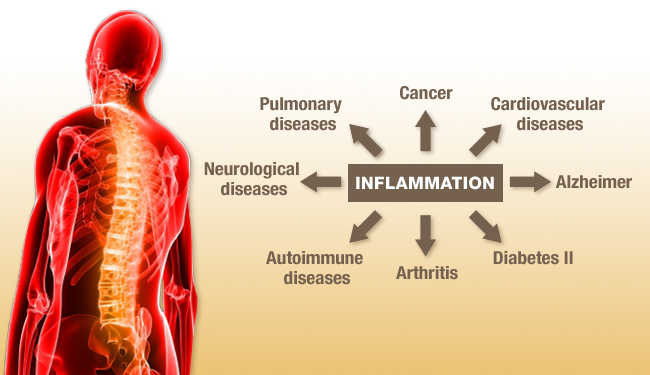Inflammation Linked To Cancer
Research Proves That Inflammation Causes Cancer
 There are very many causative agents to cancer but still with the global climate change and pollution to our environment, deforestation that has changed air composition in most parts of the world, even more cancer causative agents are yet to be known. Current research studies have linked inflammation to cancer.
There are very many causative agents to cancer but still with the global climate change and pollution to our environment, deforestation that has changed air composition in most parts of the world, even more cancer causative agents are yet to be known. Current research studies have linked inflammation to cancer.
Inflammation is one of the most effective defense mechanisms that our bodies use to protect us against the invasion of disease causing pathogens. Inflammation helps our bodies to eliminate bacteria and other chemicals that may cause disease in our bodies. Scientists say that without inflammation we can barely survive especially during infancy. So inflammations are typically beneficial to us but it also has a negative effect in our bodies. Inflammations can help in the formation as well as in the growth of cancerous cells. It may also help in metastasis.
When our bodies are invaded by foreign bodies, the bodies will react to counter the effects of the foreign body. An example is an open wound will open a path through which bacteria and other disease causing pathogens enter the body. As the bacteria enters through the open wound, the white blood cells respond by coming to the site of injury and initiates a war against the bacteria by the help of toxins that it uses to kill the bacteria. During this fight it can be seen that a swelling is developing around the injury, the area becomes red and painful. This condition should not last for long as it may cause damage to the healthy cells. After this the fighters leave the site leaving space for tissue repair and recovery agents to promote healing. This is how helpful inflammation is.
However incase the inflammation becomes too much, it may cause serious health problems. When inflammation becomes persistent, it may lead to diseases such as the rheumatoid arthritis as well as psoriasis. It may also cause cancer. Chronic inflammation leads to diseases such as pancreatitis and the Crohn’s disease which have been proved to increase one’s risk to cancer. Chronic inflammation has also been found to be the root cause of certain types of cancers stomach cancer and liver cancer.
How does inflammation cause cancer?
A new research study has proved that inflammation may cause cancer. The study done by researchers at the Ohio State University Comprehensive Cancer Center — Arthur G. James Cancer Hospital and Richard J. Solove Research Institute (OSUCCC — James) found that inflammation triggers a rise in levels of a molecule called microRNA-155 (miR-155). The rise in levels of microRNA-155 (miR-155) causes a drop in the protein that are used in DNA repair and this results in higher rates of spontaneous gene mutations which finally leads to formation of cancer cells.
“Our study shows that miR-155 is unregulated by inflammatory stimuli and that over expression of miR-155 increases the spontaneous mutation rate, which can contribute to tumorigenesis,” explains Dr. Esmerina Tili a post-doctoral researcher who also authored the research findings.
“People have suspected for some time that inflammation plays an important role in cancer, and our study presents a molecular mechanism that explains how it happens.”
“Our findings also suggest that drugs designed to reduce miR-155 levels might improve the treatment of inflammation-related cancers,” Tili explains.
The researchers have so far proved that inflammation can cause cancer, so what next? How can we limit inflammations? You need not to worry nature has provided most of the powerful anti inflammation vegetables and fruits that will help you to avoid chronic inflammations and reduce your risk to inflammation induced cancers. Some of these are curcumin and Boswellia.
Anti-inflammation properties of Curcumin and Boswellia
Turmeric (Curcumin)
Turmeric is a member of the ginger family, turmeric has been highly valued for its many medicinal abilities, among most of its medicinal abilities is that it is very effective in reducing inflammations. Turmeric is a common spice to Indians who value it for its health benefits. Curcumin is the most active component of turmeric. Curcumin is effective in reducing inflammations. It exerts its anti-inflammatory activity by inhibiting the enzymes and prostaglandins that are essential for inflammation.
Researchers at Baylor University Medical Center in Dallas conducted a research that involved dividing 45 patients with rheumatoid arthritis into three groups. One group received curcumin, the second group was given a standard rheumatoid arthritis drug and the third group was given both. After eight weeks, both the group who took curcumin alone and the group that got both the drug and the spice had a greater reduction in symptoms such as joint swelling and pain compared with those who only took the drug devoid of curcumin. It was also noted that those who were on the curcumin did not suffer any side effect as was the case with those who were under the standard drugs.
Boswellia
Boswellia is also known as frankincense. It was highly valued in the ancient times so much that when Jesus was born, the wise men brought him boswellia as a gift. This wonderful product has proved its medicinal value in treating various conditions. It is useful in reducing inflammations as well as repairing degenerated muscle tissues. Researchers have showed that it contains boswellic acids that are useful in reducing inflammations. The boswellic acids are also less toxic and do not cause any harm on the patient.
A research that was done to determine the treatment abilities of boswellia proved that it was effective. The research involved 30 patients that were suffering from osteoarthritis of the knee that were taken through placebo for 8weeks after which they were treated to boswellia for another 8weeks. The research found out that the patients’ conditions improved on the boswellia treatment than when on placebo.
To tame cancer you need reliable information. Dr. Dalal Akoury (MD) has a commitment of making this information available to you so that you can take care of your health better. Visit her website regularly and learn more.
Research Proves That Inflammation Causes Cancer


 CARDIOVASCULAR Eden Pond Turmeric Curcumin, 1000mg in Two Daily Capsules, 120 Caps #1 Best Seller in Turmeric Nutritional Supplements
CARDIOVASCULAR Eden Pond Turmeric Curcumin, 1000mg in Two Daily Capsules, 120 Caps #1 Best Seller in Turmeric Nutritional Supplements CARDIOVASCULAR Eden Pond Turmeric Curcumin, 1000mg in Two Daily Capsules, 120 Caps #1 Best Seller in Turmeric Nutritional Supplements
CARDIOVASCULAR Eden Pond Turmeric Curcumin, 1000mg in Two Daily Capsules, 120 Caps #1 Best Seller in Turmeric Nutritional Supplements CARDIOVASCULAR Eden Pond Turmeric Curcumin, 1000mg in Two Daily Capsules, 120 Caps #1 Best Seller in Turmeric Nutritional Supplements
CARDIOVASCULAR Eden Pond Turmeric Curcumin, 1000mg in Two Daily Capsules, 120 Caps #1 Best Seller in Turmeric Nutritional Supplements
 CARDIOVASCULAR Eden Pond Turmeric Curcumin, 1000mg in Two Daily Capsules, 120 Caps #1 Best Seller in Turmeric Nutritional Supplements
CARDIOVASCULAR Eden Pond Turmeric Curcumin, 1000mg in Two Daily Capsules, 120 Caps #1 Best Seller in Turmeric Nutritional Supplements

























